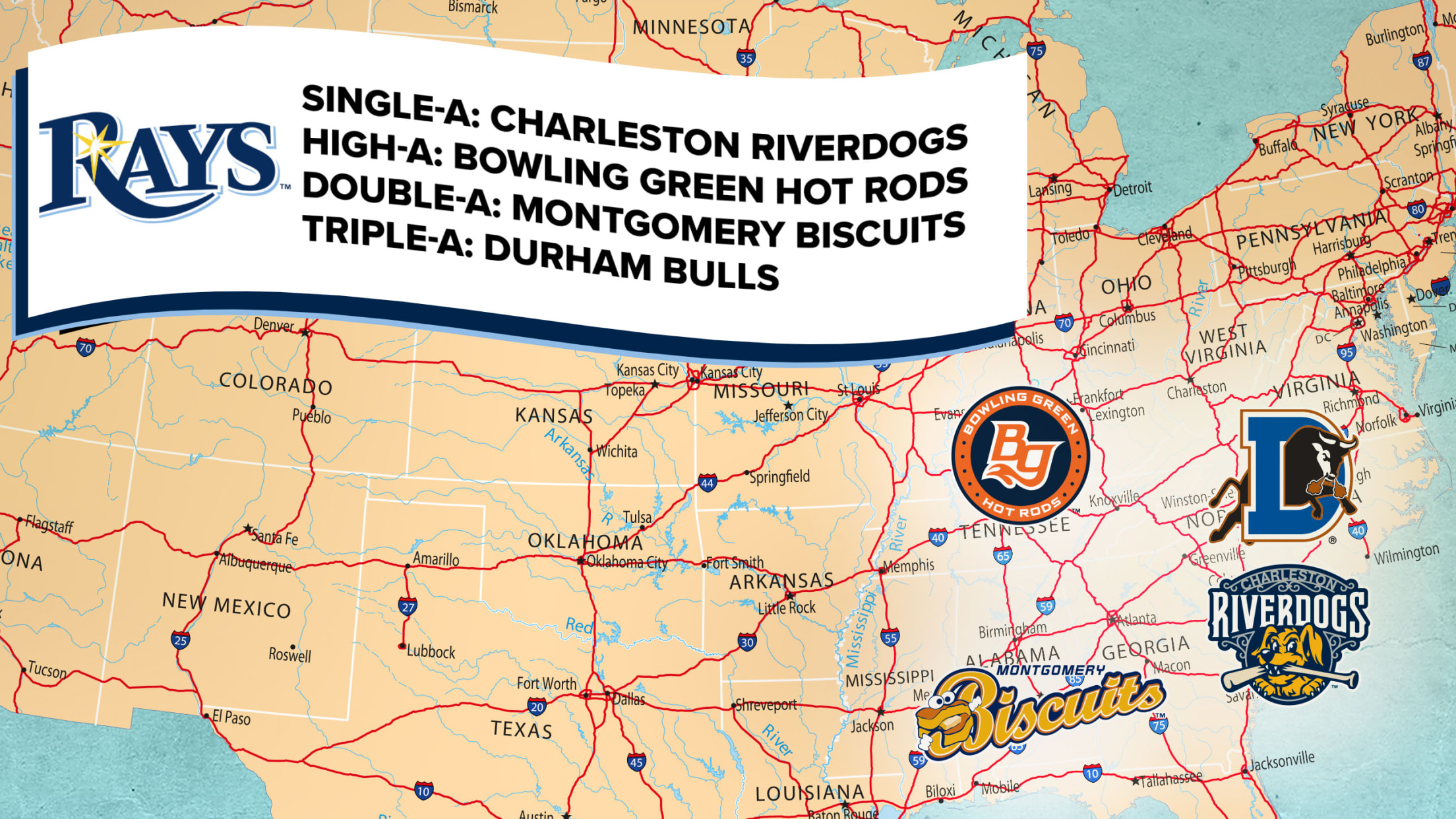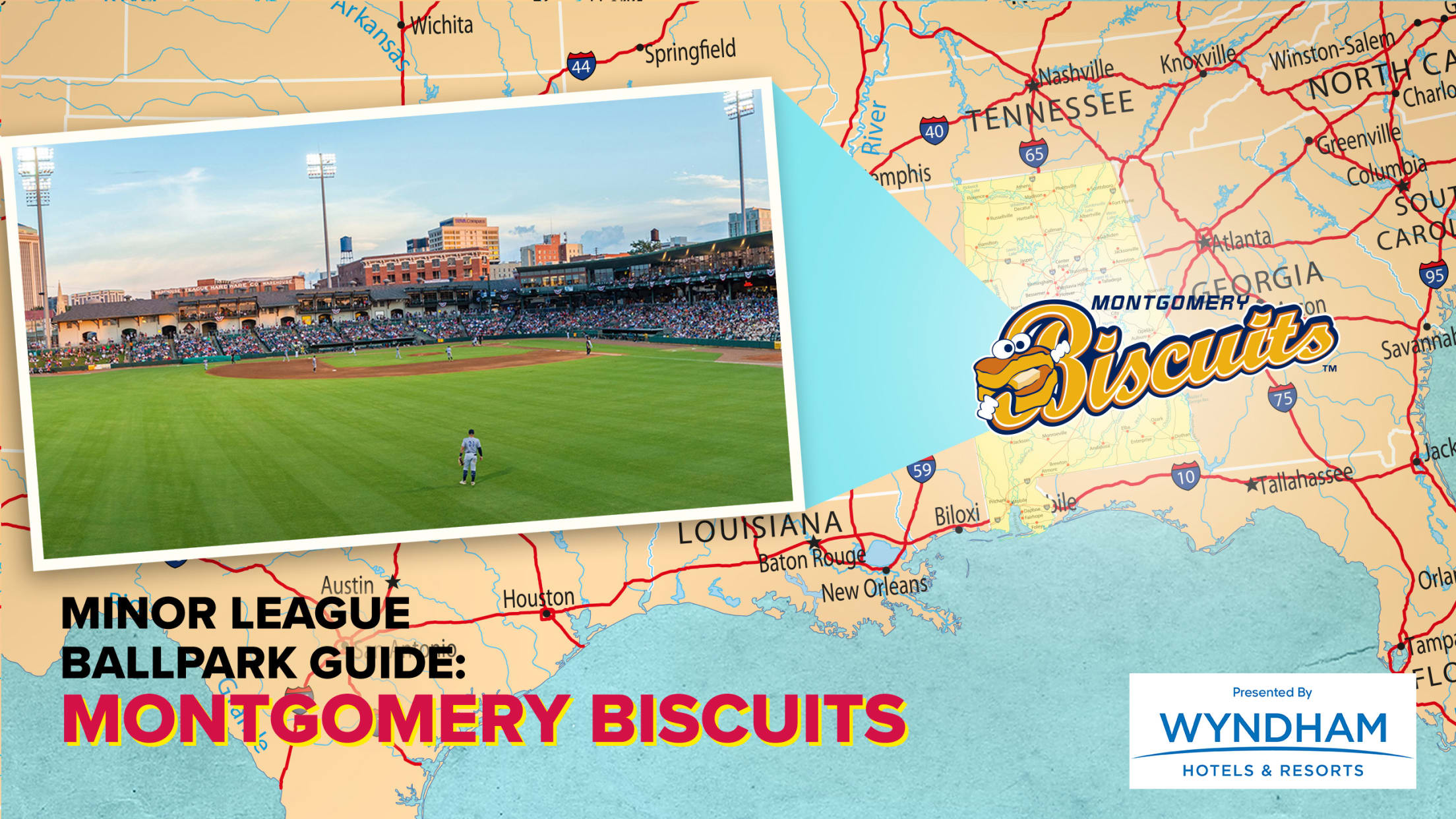Explore Montgomery's Riverwalk Stadium

Welcome to Riverwalk Stadium, where the fans choo-choo cheer on the home team in a converted train shed, Southern League baseball dates back to the 19th century and the Biscuits are always cooking up a good time.
Montgomery Biscuits (Affiliate of the Tampa Bay Rays since 2004)
Established: 2004
Ballpark: Riverwalk Stadium (opened 2004)
League: Double-A Southern League
Championships: 2006, 2007
Alumni: B.J. Upton, Scott Kazmir, James Shields, Evan Longoria, David Price, Kevin Kiermaier, Blake Snell
Ballpark Guides for EVERY Minor League team ?
Ballpark Guides for Rays' affiliates ?
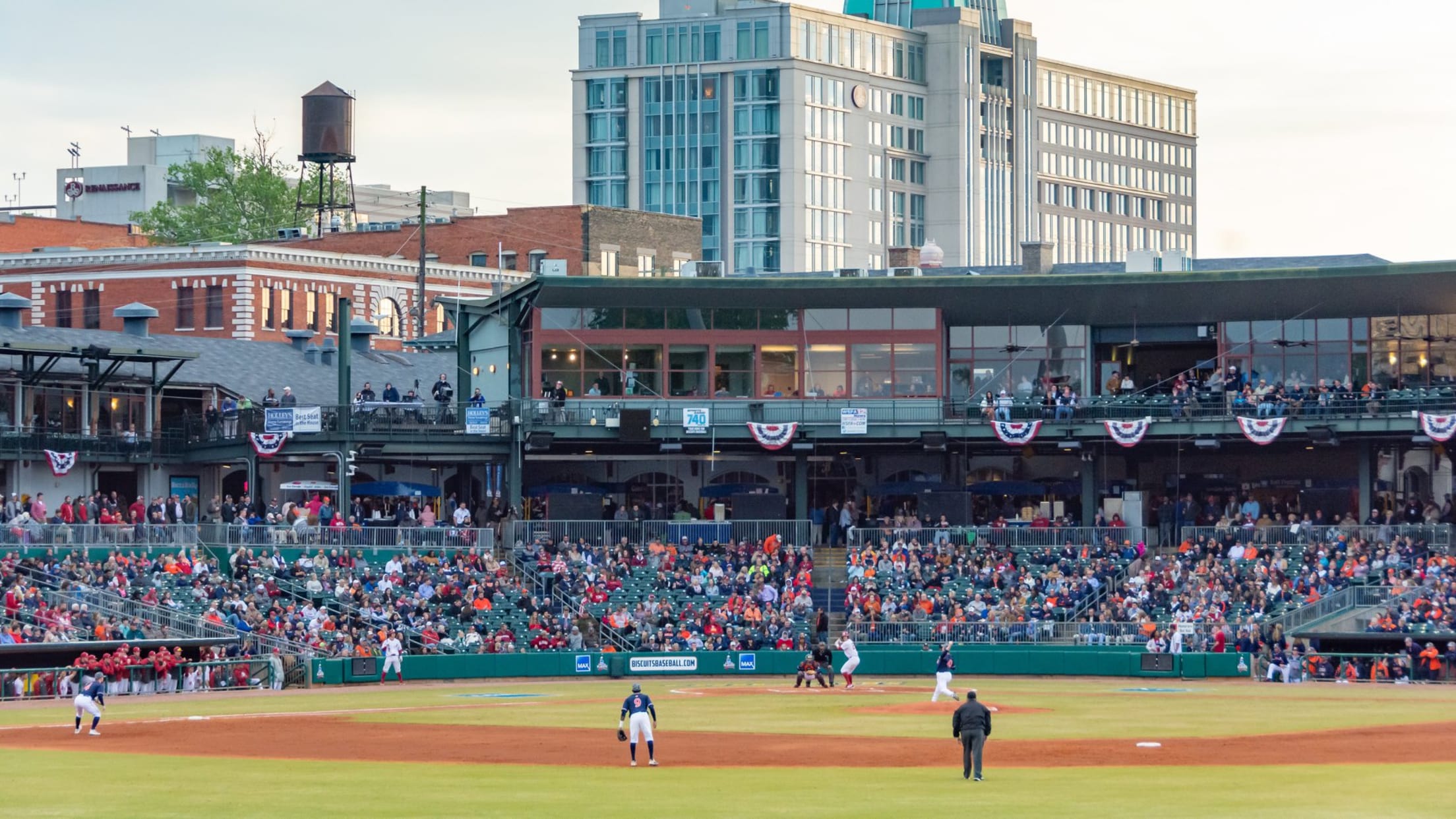
When Montgomery cooked up the Biscuits for the 2004 season, the result was the return of Southern League baseball to Alabama's capital city after a 23-year gap. Today, the Biscuits franchise carries on as the longest continually active team in Montgomery's Minor League history. Since its arrival, the team has been credited with playing a huge role in revitalizing the city's downtown, and with providing a lot of wonderful nights at the ballpark for a whole lot of fans.
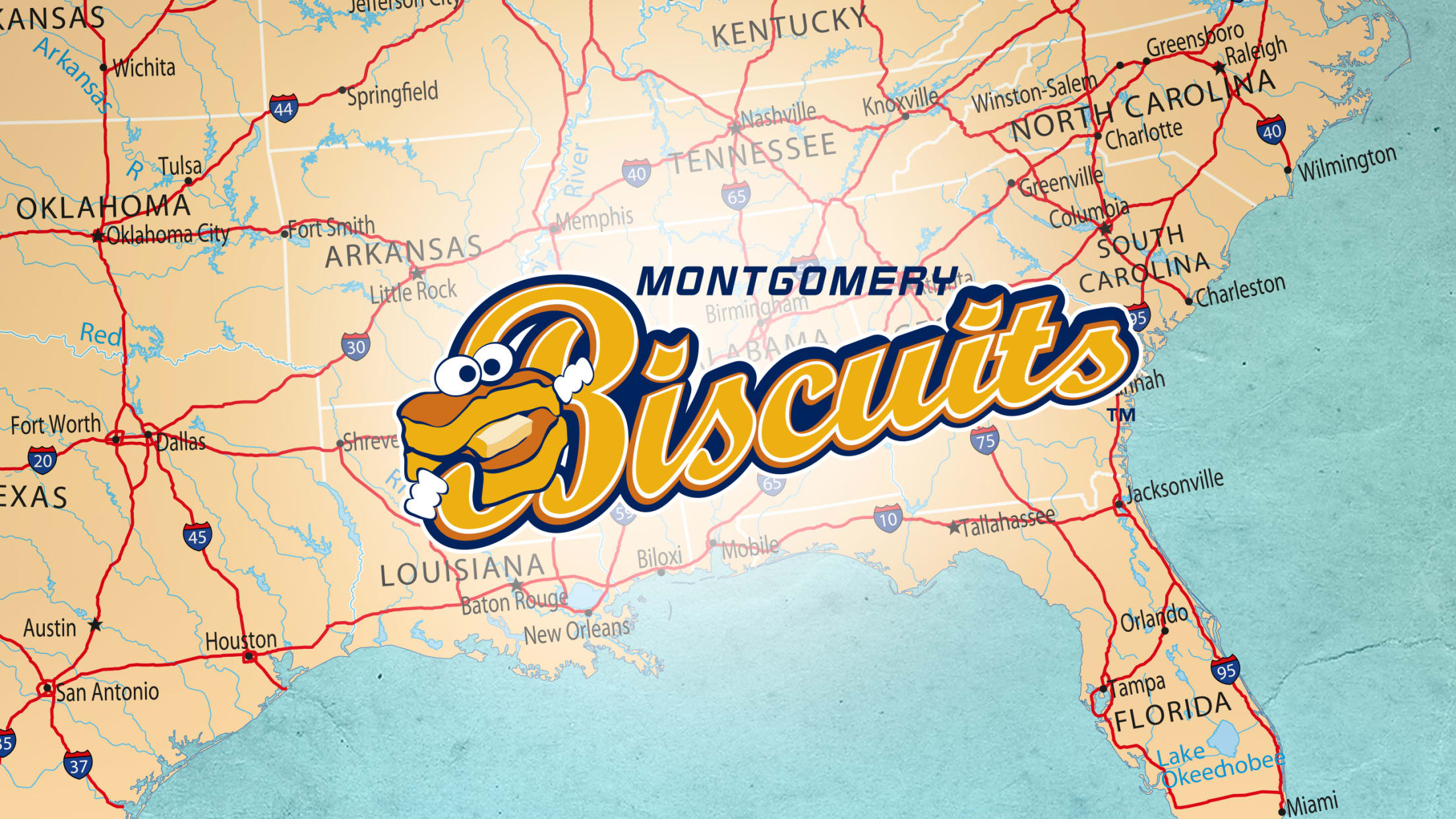
Riverwalk Stadium
Ballpark Location (Google Maps)
Montgomery Biscuits Roster
Montgomery Biscuits Schedule
200 Coosa St.
Montgomery, AL 36104
(334)-323-2255
Capacity: 7,000
Dimensions: left field, 314 feet; center field, 400 feet; right field, 333 feet
Park Factors (2021-22)
100 = league average
Runs: 101 | Homers: 111 | Hits: 102
Southern League environment: 4.77 runs per team per game (ninth-highest of 11 full-season leagues)
Before there were Hartford Yard Goats and Amarillo Sod Poodles and Rocket City Trash Pandas, there were Montgomery Biscuits, with their irreverent and cartoonish biscuit logo either juxtaposed or perfectly matched -- these distinctions are in the eye of the beholder; who can say definitely? -- with the stately blue and butter colors.
Homegrown family-friendly fun is clearly the main idea here, and the Biscuits dish it out in a stadium that's as distinct as the team's identity.
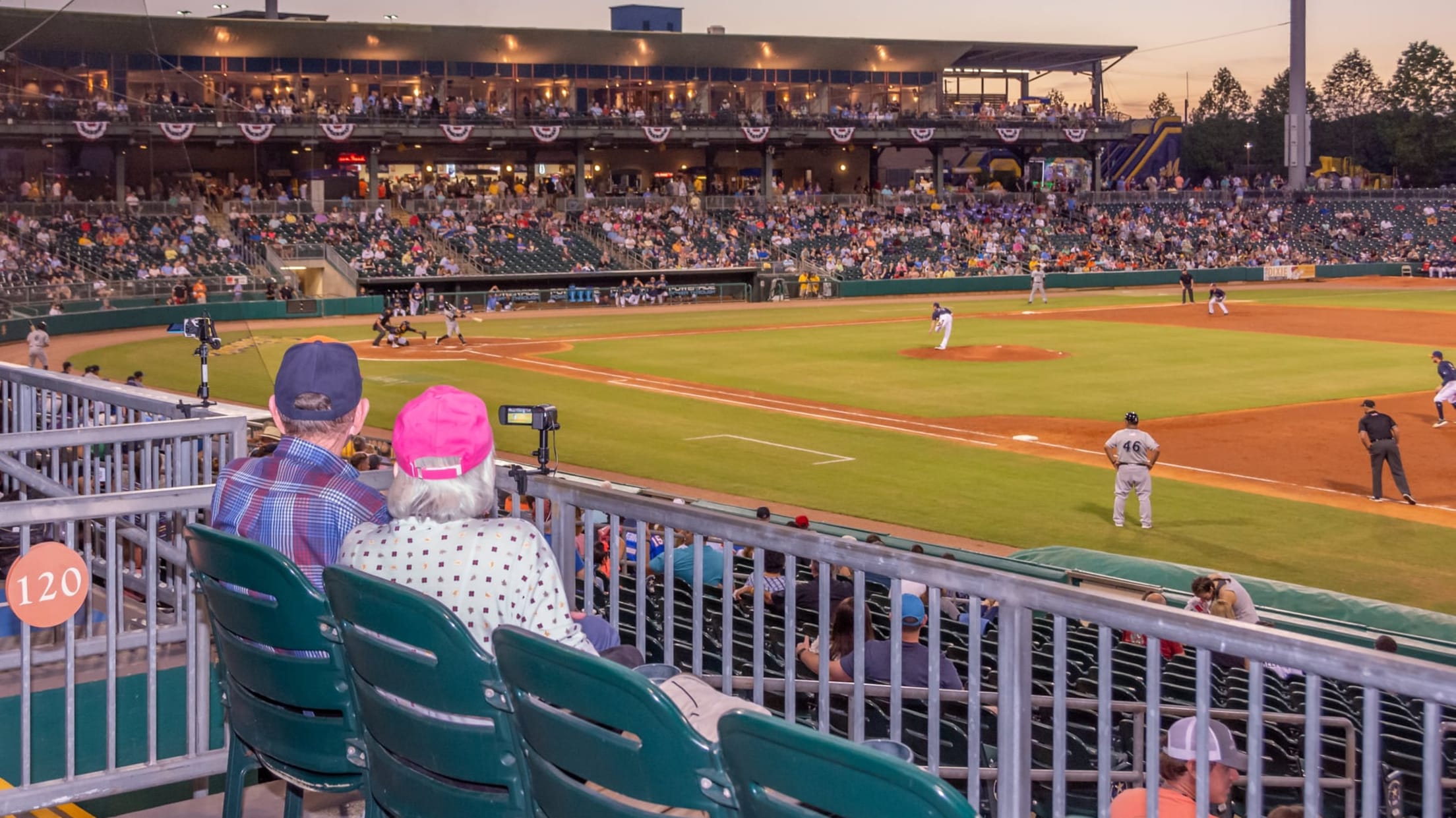
The Biscuits have also been known to play as "the Greenbow Biscuits" in an homage to the 1994 cinematic triumph "Forest Gump," beginning with a "Gump in the Gump" theme night in 2018 and continuing with a full-blown (gumped-out?) Gump Weekend in 2022. The alternate caps and jerseys have a throwback feel befitting a celebration of the film.
Creating food-inspired alternate identities has been one of Minor League Baseball's most popular trends of the last decade. The Biscuits, of course, beat the world to it by adopting a comestible as their main identity. But they've also joined in the fun of late, bringing a Montgomery Kimchi moniker and uni design into the fold in 2021 for Korean Heritage Nights. (Montgomery features a large and growing Korean and Korean-American community, thanks in part to a Hyundai plant that opened in 2005).
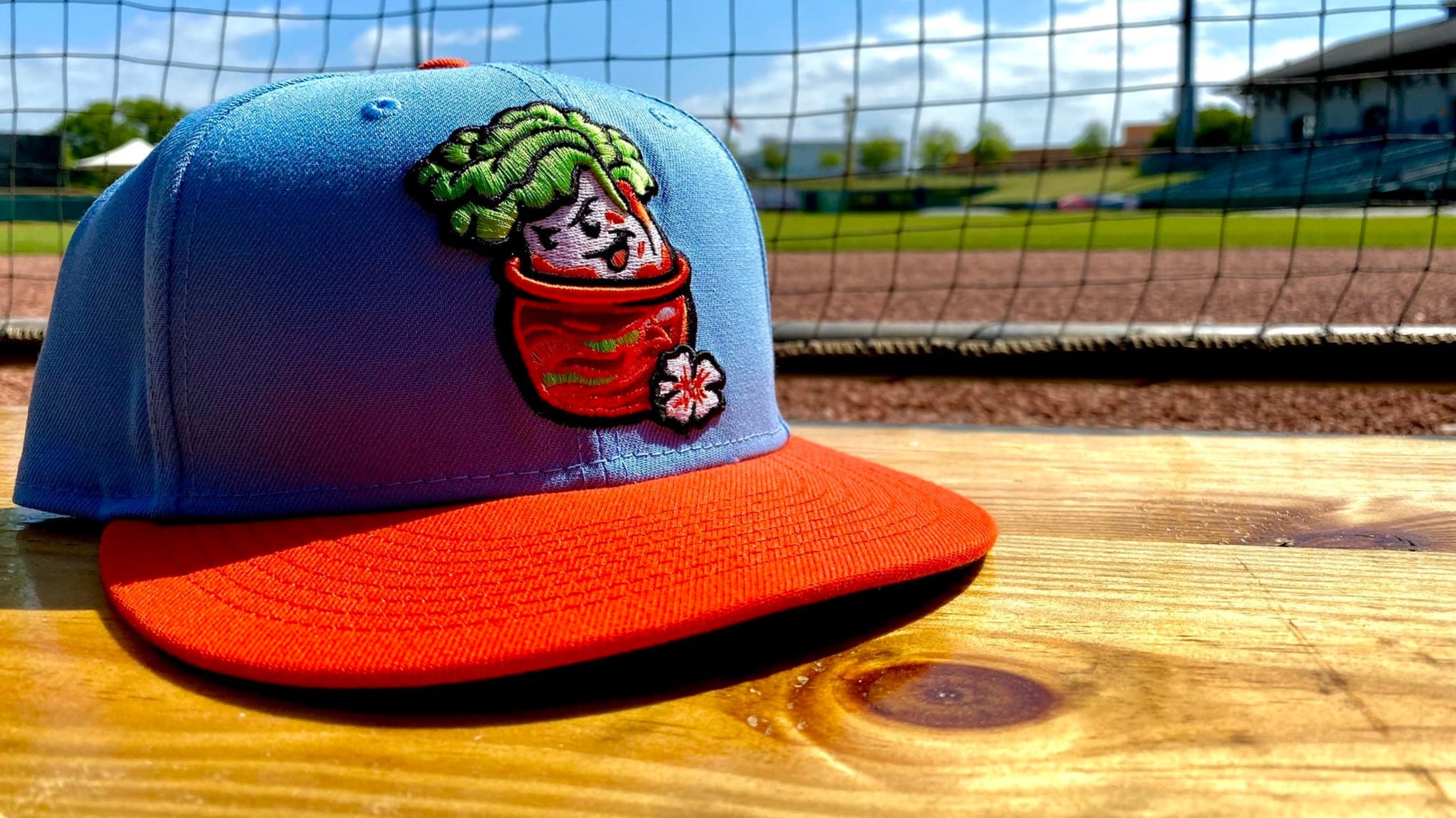
Although the Double-A team (whether playing as the Montgomery Biscuits, Greenbow Biscuits or Montgomery Kimchi) began play in 2004, the city has a long Minor League history. It featured an entry in the Southern League of 1892-93 and 1895-96, several teams in the Southern Association, South Atlantic League and Southeastern League throughout the first half and middle of the 20th century and the Southern League's Montgomery Rebels of 1965-80.
The Montgomery Grey Sox competed in the Negro Southern League beginning in 1920 until the conclusion of the 1932 season, featuring legend-in-the-making Paul Hardy in their final campaign.
Features
In Montgomery, the old ballyard is in fact the old trainyard. More specifically, the exterior of the first-base side of Riverwalk Stadium is still the facade of a train shed dating back to the end of the 19th century.
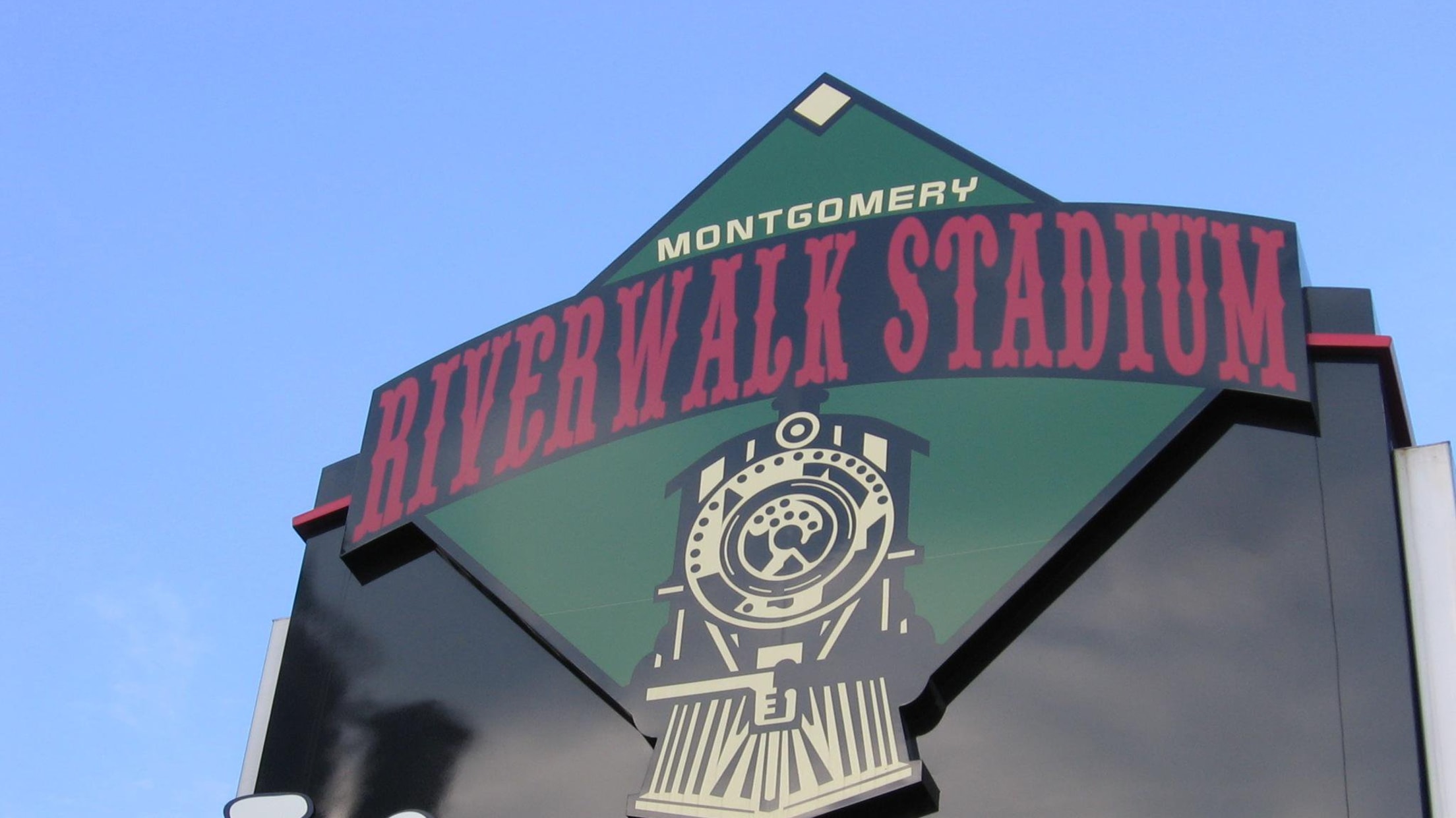
But Riverwalk Stadium is more than a pretty place to take a picture or meditate on train travel. It's one of Minor League Baseball's finest venues for enjoying a game. Featuring an intimate seating bowl in front of and beneath a deck on an elevated suite level along the third-base side, which is supported by stately riveted beams of steel painted a color that might as well be marketed as "old ballyard green."
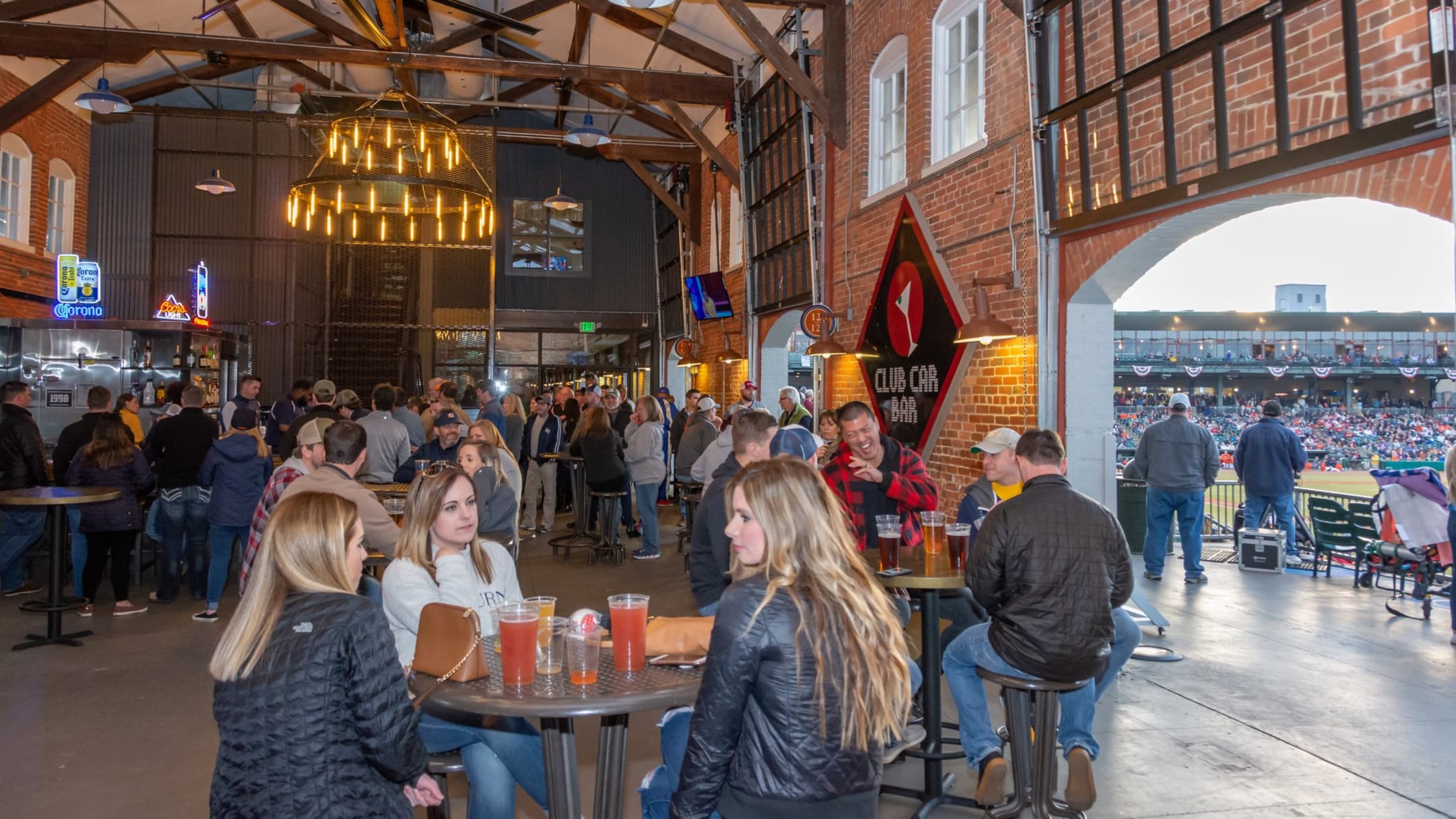
The section down the first-base side, backed by an exterior wall of the train depot, abuts a berm with general admission seating options, which extend into right field.
The layout cultivates a timeless atmosphere that's down home with a touch of big league grandeur. The seating in the bowl features a less dramatically raked grade than fans might be used to, meaning most tickets will allow you to feel nearly level with the action. Trees line areas beyond the outfield walls, particularly out past left field between the ballpark and the river, which can create splendid views of rose-hued skies above the leafy expanse.
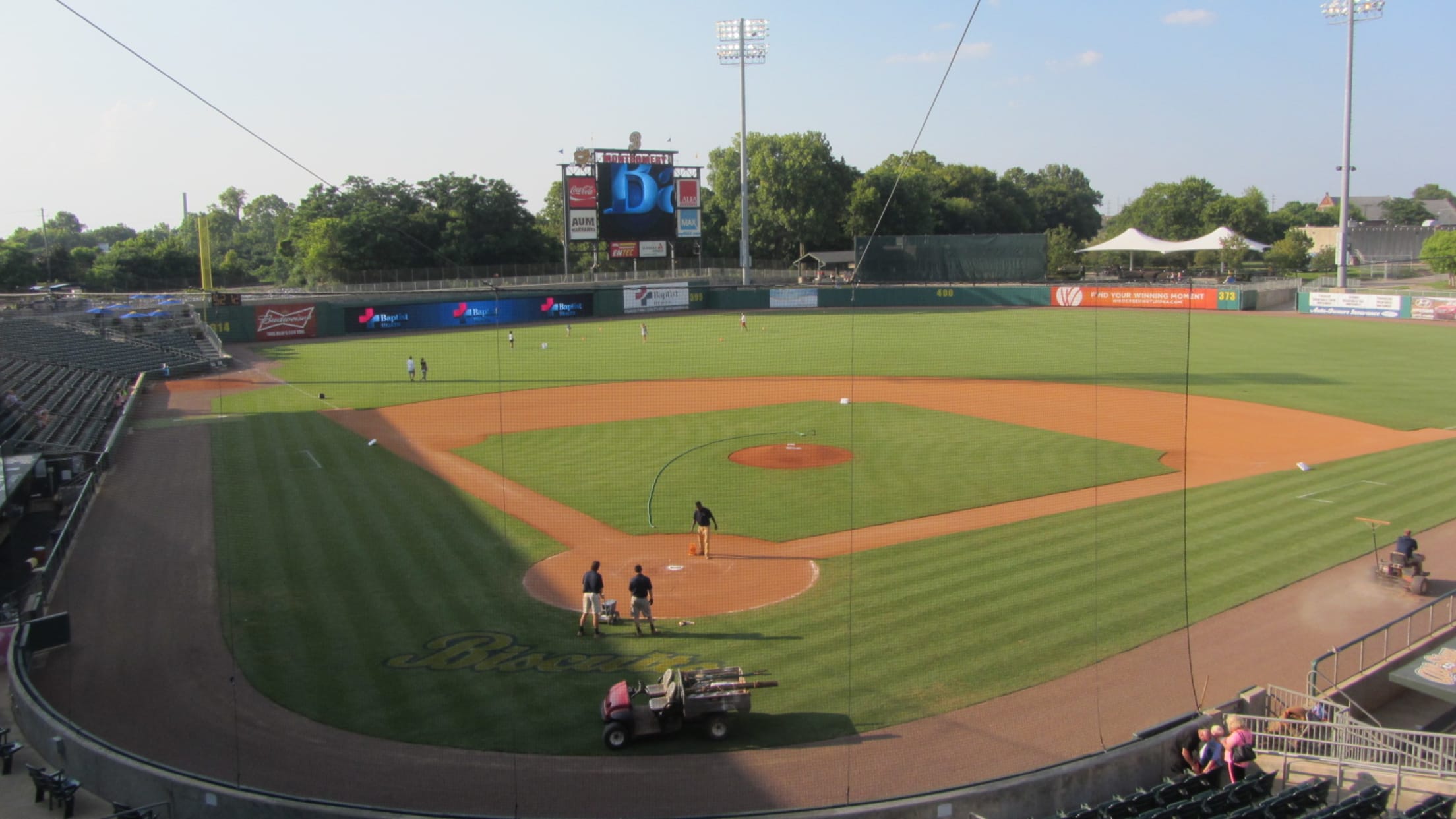
The 360-degree concourse practically demands you make time to take one full lap around the park and soak it all in. While you're out in center field, you'll spot the Boxcar Buffet, which can hold up 2,500 people but is just one of the Biscuits' several group outing options with railroad themes. (Check out the Whistle Stop Grille and the Locomotive Loft, for example.)

Concessions
Obviously, eat a biscuit. You didn't come to the home of the Montgomery Biscuits to skip the biscuits. To get some, look for the concessions cart with the big awning advertising "Biscuits (of course!)" on the main concourse, and be ready to choose between sweet and savory options.
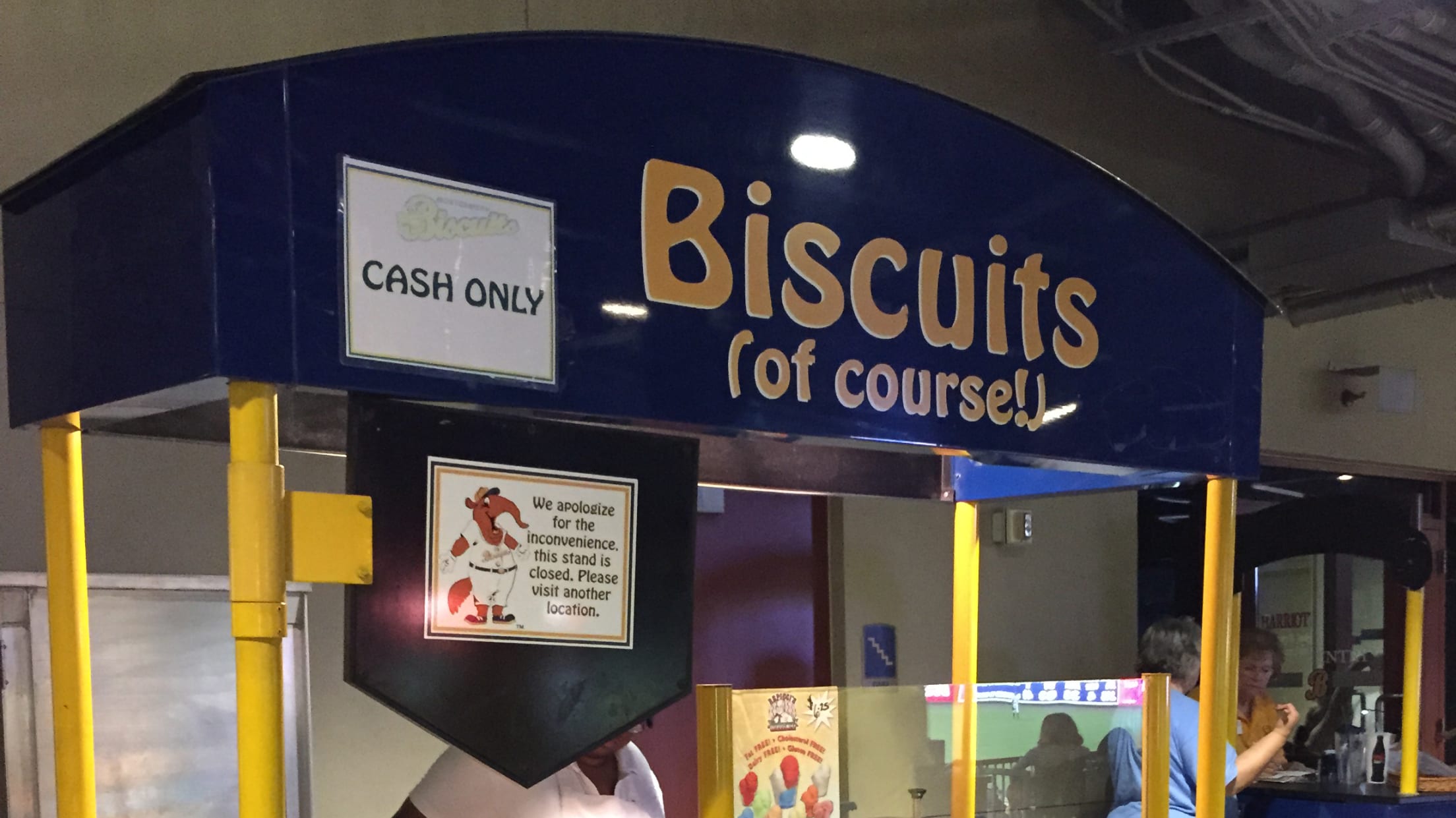
On a hot summer's day (or whenever), a trip to the ice cream stand next to the main concession stand will be in order.
But you could also do a lot worse to beat the heat than chilling out for a half inning at the Club Car Bar down the right-field line. It's air-conditioned, featured eight TVs and offers a wide array of mixed drinks and craft beers.
Among the adult beverages you'll find in the park is the highly quaffable Crafty Lefty lemon shandy, specially made for the Biscuits by Montgomery's own Common Bond Brewers.
If you're lucky enough to be at Riverwalk Stadium during one of the Biscuits' Korean Heritage Nights, you can find kimchi hot dogs, kimchi hamburgers and kimchee nachos. The team has also partnered with Seoul-based Pulmuone Foods to offer kimchi samplings on the concourse.
Mascot
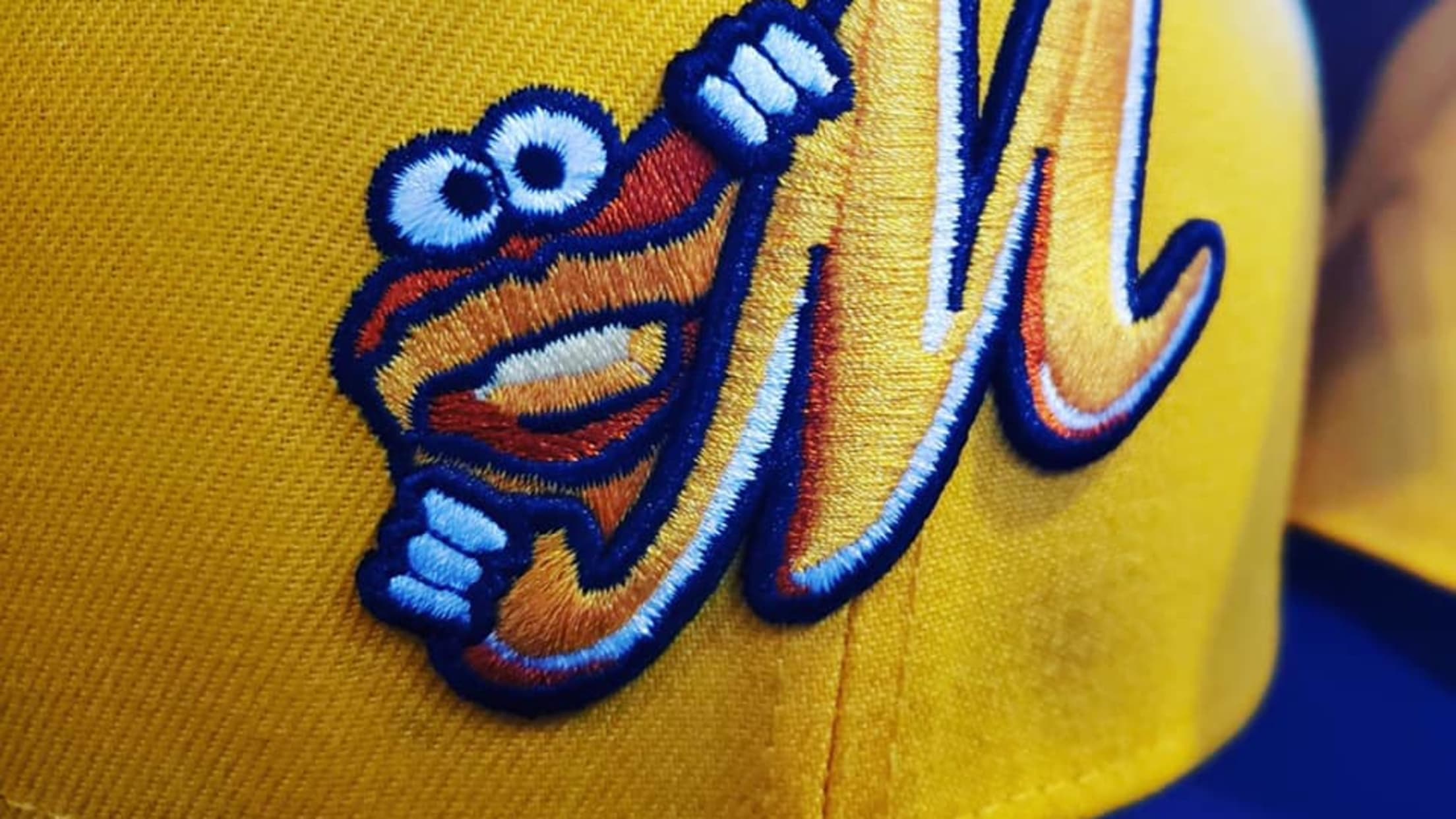
The Biscuits have a biscuit mascot, of course. His name is Monty, and he's arguably the most famous part of the franchise, considering he can be seen on Montgomery's caps and logo sets and was once lauded on national television by none other than Al Roker.
But he's not alone.
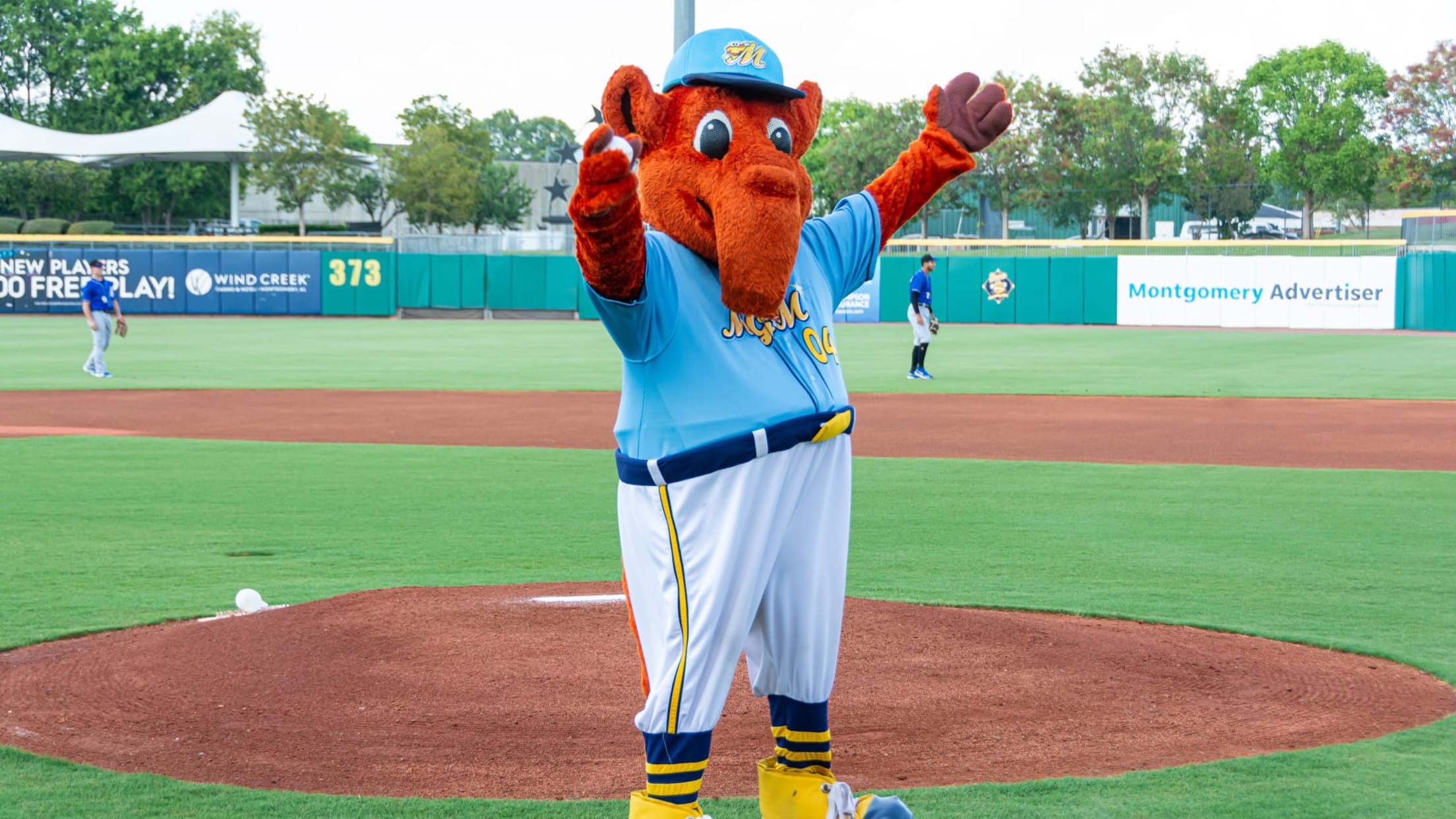
Big Mo, regularly mistaken for an anteater, is in reality a "Biscuit Loving Beast," per the team. Whatever his genus, his genius is clear. He's got an undeniable talent for spreading cheer and elevating the good times in the ballpark and in the Montgomery community.
Where to Stay
Headed to the stadium and looking for a hotel nearby? Your Wyndham is waiting. As the Official Hotel of Minor League Baseball, Wyndham Hotels & Resorts welcomes baseball fans with a portfolio of 24 trusted brands. Find Hotels by Wyndham closest to the ballpark below and book now at wyndhamhotels.com.
? Days Inn by Wyndham Coliseum Montgomery AL
? Days Inn by Wyndham Montgomery
? Wingate by Wyndham Montgomery
? Days Inn & Suites by Wyndham Prattville-Montgomery
? Baymont by Wyndham Prattville
Local attractions
Those interested in art will want to check out the Montgomery Museum of Fine Arts, which is especially rich in regional art but features a wide range of work across many media. Country music buff? Your first stop might be the Hank Williams Museum. More of a bookish type with Jazz Age leanings? Go directly to the Scott & Zelda Fitzgerald Museum.
But visiting Montgomery as a tourist probably indicates some degree or another of interest in the city's past, and especially its role in the civil rights movement. Most famously the site of the bus boycott sparked by Rosa Parks' act of civil disobedience in 1955, Montgomery is home to the Rosa Parks Museum, operated by Troy University. It's located within walking distance of the ballpark, at the location where Parks was arrested, and offers exhibits, artifacts and documents related to the activist's life and legacy, as well as to the civil rights movement more broadly.
Speaking of the civil rights movement more broadly, Montgomery's Civil Rights Monument is about a half mile from the Rosa Parks Museum, and the Alabama Historical Commission's Freedom Rides Museum is at a historic Greyhound bus station between the two points.
Those interested in expanding their exploration of civil rights movement history beyond city limits will want to travel the Selma to Montgomery National Historic Trail, which commemorates three 1965 marches.
Of course, the struggle for freedom and equality for Black people in Montgomery did not begin nor end with Rosa Parks' refusal to move to the back of a bus and the ensuing decade or so. Among the many worthwhile Montgomery sites, museums and monuments dedicated to examining this history and honoring those who endured it or sought to rectify the evils of slavery and persistent racism are The Legacy Museum, The National Memorial for Peace and Justice and the Dexter Avenue King Memorial Baptist Church and Parsonage.
Even Riverfront Park -- just beyond and behind Riverwalk Stadium's left-field foul pole on the banks of the Gun Island Chute -- is a spot appropriate for contemplation of the heavy past; it was once a hub of the slave trade.
Food and drink
If you go to Alabama, go hungry. A heritage of downhome cooking and hospital means visitors should be ready for a gastronomic extravaganza.
At the Simply Southern Cafe, you'll find exactly what the name promises. Although the menu is refreshed from day to day, you can count on the classics -- and a vegetarian meal option. And no matter when you go, the value will be hard to beat.
Pierce's Country Cooking, Mrs. B's Home Cooking and J.W. Beverette's Soul Food are among other local favorites.
The Capitol Oyster Bar does seafood with a Southern flair and offers live music -- usually blues or bluegrass.
As discussed, Montgomery's status as a Korean cuisine capital might come as a surprise to some but can be disputed by none. The abundance of options assures quality. In a competitive scene like this, nobody's getting away with serving anything other than the most inspired and appetizing specialties. But spots that turn up again and again on lists of local favorites include Uh Woo Don, Kalim Korean BBQ and So Gong Dong Tofu & BBQ.
Beer enthusiasts who have tried the Crafty Lefty at the park will also be sure to get to the Common Bond Brewers' nearby Taproom. The Tower Taproom, a few dozen steps from your seat in Riverwalk Stadium, styles itself "Alabama's first self-serve beer bar," and has 57 taps and a robust food menu. Across town, the Gin, in addition to a variety of specialty house cocktails featuring its namesake spirit, has numerous craft beers and frequently does tap takeovers with guest brewers.
Moving on
The South is one of Minor League Baseball's hotbeds, both historically and today. Those with time for a prolonged road trip could start just about anywhere below the Mason-Dixon line and hit the homes of such storied franchises as the Durham Bulls, the Chattanooga Lookouts, the Birmingham Barons and, of course, the Biscuits, whose original and somewhat irreverent branding paved the way for relative Southern League newcomers -- and relatively nearby clubs -- like the Rocket City Trash Pandas, the Pensacola Blue Wahoos and the Biloxi Shuckers.
With such a Minor League-rich region, travelers can create a solid road trip itinerary of any duration. If the infinite possibilities make planning such a journey daunting, consider a simple-yet-loaded route from Nashville (home of the Sounds, Triple-A affiliate of the Brewers) to Madison, Ala. (home of the aforementioned Trash Pandas, Double-A affiliate of the Angels) to Birmingham (Double-A affiliate of the White Sox) to Montgomery. You'll see four great Minor League ballparks with under five hours of driving, almost all of it straight down Interstate 65.
The road to Tampa Bay
The Rays have, through dint of design or pure luck or something in between, one of the most fun Minor League systems for a fan to traverse. By the time a Tampa Bay prospect arrives in Montgomery, he may have already made stops with the Bill Murray-co-owned Charleston RiverDogs and the extremely creative Bowling Green Hot Rods. The final rung on the organizational ladder before the big leagues is with the historic and world-famous Durham Bulls.
Single-A: Charleston RiverDogs
High-A: Bowling Green Hot Rods
Double-A: Montgomery Biscuits
Triple-A: Durham Bulls
